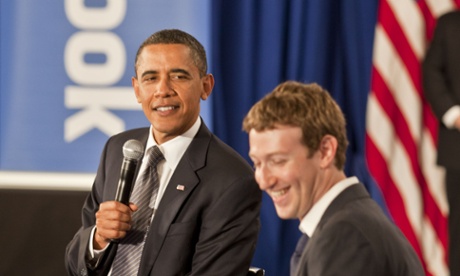
The US technology industry has become an extraordinary force in politics in the past decade, but has bewildered America’s political establishment with its bizarre loyalties. The big technology firms appear to be the arch-nemeses of labor unions, on issues ranging from high-skilled immigration and the taxi industry to free trade and their aggressive funding of union-less public charter schools.
Yet tech CEOs are arguably the biggest cheerleaders of the Democratic party: in the US 2012 presidential election, 83% of employee donations from top tech firms went to Barack Obama. “Most of Silicon Valley, most of the executives, tend to be Democrats,” PayPal co-founder Peter Thiel has acknowledged.
To understand whether this unconventional behavior was just convenient political manoeuvring or something more ideologically consistent, I surveyed 129 tech industry founders and executives. (I contacted them through Crunchbase, the tech industry database run by TechCrunch, where I worked as a reporter for two years. See methodology for survey details.)
The results suggest that internet startup founders represent an entirely distinct, libertarian-like ideology within the Democratic party. Tech startup founders see the government as an investor in citizens, rather than as a protector from capitalism.
As libertarians, founders typically share the stereotypical fervor for the free market, but they also believe the government has a duty to actively help citizens solve global problems. They believe government should embrace the unforgiving meritocracy of capitalism by operating like a high-tech company – which is how union-less Silicon Valley-funded charter schools often operate – and they also believe the government should intervene in personal decisions, encouraging citizens to be more educated, healthier, and civic-minded.
The philosophy of the tech industry could best be described as “radical idealism”. Founders describe themselves as optimists, first and foremost.
“What makes Silicon Valley special? Eternal optimism of the innovative mind,” wrote tech blogger Om Malik. Investor Marc Andreessen said: “I’m maybe the most optimistic person I know. I mean, I’m incredibly optimistic. I’m optimistic arguably to a fault, especially in terms of new ideas.”
This idealism is not rhetorical fluff. It’s founded on two deep-seated assumptions about the world: change is inherently progressive and there are no conflicts between major groups in society. “I tend to believe that most Silicon Valley people are very much long-term optimists,” LinkedIn founder Reid Hoffman told me. “Could we have a bad 20 years? Absolutely. But if you’re working towards progress, your future will be better than your present.”
This optimism also extends to present day society. If Democrats traditionally believe in a conflict between corporations and citizens, then libertarians fear a battle between the government and citizens. But founders don’t appear to recognize any conflicts between any major group in society.
Indeed, when Elon Musk explained why he was giving away his Tesla patents, he noted: “If we’re all in a ship together and the ship has some holes in it, and we’re sort of bailing water out of it, and we have a great design for a bucket, then even if we’re bailing out way better than everyone else, we should probably still share the bucket design.”
This cooperative view of humanity has fascinating implications for foreign policy as well: founders are not big supporters of sovereignty. They share the libertarian love of free trade, but generally because they are drawn to alliances that require cooperation between nations. In the words of Wikipedia co-founder Jimmy Wales: “I believe in the elimination of borders and free commerce as a route to peace. Barriers necessarily imply violence.”
At their philosophical core, Silicon Valley’s elite believe that information is a panacea, that nearly every problem can be solved through conversation, education, or innovation. Are there were any problems that can’t be solved by great education alone? Could military enemies resolve disputes through dialogue alone? Nearly all founders replied that education can solve all or most problems from violence to political partisanship, and they also emphatically stated that disputes could be resolved through negotiation.
While the founders’ ideology is novel in American politics, it does have a few analogues. In modern politics, it’s close to what political scientists refer to as “communitarianism”, the belief that communities are often better at solving social ills than government agencies. This is what Alphabet chairman Eric Schmidt describes as the “religion” of the tech industry, and chimes with the principles of the sharing economy – that public transit could be replaced with Uber-like carpooling, or that Airbnb could ease the housing crisis.
Historically, these beliefs are more akin to the European Enlightenment era, during which a faith in information was actually a recognizable ideology. After the French Revolution, the victors smashed churches and erected monuments to reason.
For centuries, extreme optimism in the wisdom of the crowds has lain dormant. But it appears that the knowledge economy is giving this old idealism new life, the basis of several billion-dollar industries. “It’s the hacker ethic that a lot of problems in the world are information inefficiencies,” Facebook founding president Sean Parker said.
Regardless of how powerful Silicon Valley actually becomes, innovation itself is becoming a distinct ideological category within American politics. It’s not just about tech issues like immigration and broadband access, but how all of America’s institutions can be reshaped in Silicon Valley’s image.
- Journalist and author Gregory Ferenstein has been researching Silicon Valley’s attitudes to politics, privacy and inequality as part of the series
The Age of Optimists: A quantitive glimpse of how Silicon Valley will transform political power and everyday life

